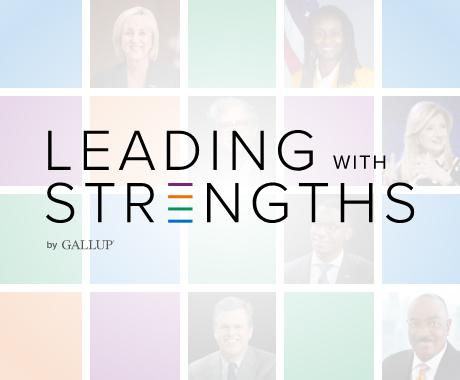Story Highlights
- Understanding your strengths can help you have an outstanding interview
- Knowing your weaknesses shows employers that you are self-aware
- Using your strengths daily encourages growth and development
You did it: You landed an interview for your dream role.
But the competition is intense, and to get an offer, you need to differentiate your strengths from others' during the interview. But to do that, you need a clear, meaningful understanding of your strengths and weaknesses -- your talent DNA.
Having perspective about your natural abilities does far more than help you answer the question, "What are your strengths?" A science-based evaluation of what you uniquely do well enables you to answer every interview question more confidently, authentically and specifically.
Here's an example based on the CliftonStrengths assessment: Imagine the interviewer asking you to discuss an experience with team conflict. Instantly, you think of your high Competition strength, which pushes you to win at all costs, and a time when your team struggled with poor alignment and communication. As a result, you share a genuine, detailed description of how you used your competitive ambition on shared victories, inspiring your teammates to hit a performance milestone.
A person's CliftonStrengths profile reveals their patterns of thought, feeling and behavior ranked by intensity. Your top themes are areas where you naturally excel; your bottom themes have less influence on how you behave. Learning about your themes prepares you for any interview because your profile captures who you are, who you're not and why you're exceptional.
With this knowledge, you can explain how your abilities fuel success when you join, create or lead a team. Here are three benefits of CliftonStrengths that can help you have an outstanding interview:
A language to describe your talent DNA. Awareness of your strengths helps you think about and describe yourself better with everyone in your life, including hiring managers. Your strengths explain how you work with others and the unique role you play on teams -- and give you an easy way to talk about it. Plus, once you get the job, strengths can help you distinguish yourself in conversations about promotion and advancement. You might also learn that the hiring manager knows their CliftonStrengths, which could lead to an insightful discussion about your talent themes that leaves a lasting impression on them.
Greater confidence and empowerment. Thanks to a better understanding of what makes you uniquely powerful, strengths gives inspiration, meaning and fulfillment. Strengths helps you direct your attention to what you do best -- and reframe what doesn't come naturally to you. As a result, you feel more positive and confident. And that confidence can go miles in an interview.
Memorable authenticity. Interviewees stand out when they share specific examples of how they would make a difference in the organization. When you know your strengths, you can be relatable, detailed and unforgettable when describing why you'd benefit the company.
A science-based evaluation of what you uniquely do well enables you to answer every interview question more confidently, authentically and specifically.
How to Talk About Your Strengths
It's inevitable -- the hiring manager will ask you to talk about your strengths. Here are several strategies to help you knock it out of the park:
- Read your strengths report. Pay special attention to the words or phrases in the descriptions of your top strengths that really resonate with you. Review your report before the interview to help you easily recall examples that describe who you are and what you'd bring to the role. Consider unlocking access to the full 34 themes report, which gives you:
- a detailed breakdown of your top 10 CliftonStrengths themes, including potential blind spots for each theme
- advice on how to navigate all 34 themes
- ideas to identify and manage potential weaknesses
- Study the role that you're trying to get. Read the job description, talk to people you know in that role and learn more about it online. Take time to learn about the team, company and demands they face. Imagine how your strengths align with the day-to-day requirements and demands of the role.
- Connect your strengths to the role. Where do you think your strengths would shine most? How would your strengths benefit customers? The team? Imagine a few specific situations where your strengths would help you excel and support the team in accomplishing its goals -- whether those objectives are providing excellent customer experiences or innovating for the future.
- Be specific and tailor your answers. You don't have to talk about all of your strengths in your response. Describe one or two strengths in detail to help the hiring manager understand how and why you are the person they've been looking for.
- Own your strengths. It can be challenging to promote yourself, but that's exactly what a job interview requires. Be confident, and aim to "self-brand" yourself by showing your authentic talents and strengths. You can own your strengths without seeming arrogant if you emphasize how your strengths would empower you to meet the needs of the role.
- Get a coach. For individualized support, consider working with a Gallup coach for one-on-one, personalized guidance about your career growth goals, developing your strengths and owning your strengths in an interview.
Strengths helps you direct your attention to what you do best -- and reframe what doesn't come naturally to you.
What About Weaknesses?
The hiring manager will likely ask you about your weaknesses or past struggles. How do you answer those questions?
Gallup has found that weaknesses will never turn into strengths -- but don't ignore them. You need to be aware of your weaknesses, take responsibility for them and have a plan for ensuring they don't get in the way of your progress.
In an interview, discussing your weaknesses will make you seem self-aware -- not like a lesser candidate. But be sure to emphasize how your strengths help you manage weaknesses. For instance, you might share the following example:
"I used to get nervous about going to networking events. I wouldn't describe myself as a naturally outgoing person, but I'm incredibly inquisitive (Ideation and Input) and love to learn about people. Recently, I've approached social settings as if they were a focus group. I prepare a couple of great questions in advance, then see the event as an opportunity to collect some great ideas and stories. I'm finding that this strategy helps make the event less intimidating and more interesting."
Here's another tip about weaknesses: Complementary partnerships are a powerful workaround for your bottom themes. Complementary partnerships help each person do what they couldn't do separately. With this in mind, you might answer interview questions about weaknesses by talking about how you join forces with others with reciprocal natural abilities.
For example, perhaps you discuss how your creativity (Ideation) combines well with a colleague's attention to detail and strategic mind (Analytical):
"On a quick-turn project, we each contributed something the other lacked, which took the result to the next level."
Stand Out From the Crowd
Let's be real: Job interviews can be nerve-wracking. But with the right knowledge and preparation, you can leave an impression that gets you an offer.
Strengths can give you an advantage once you're hired, too, because strengths prepares you for endless growth and development -- personally and professionally. Gallup has found that people achieve the highest levels of success when they apply and develop their strengths -- in fact, they're three times as likely to say they have an excellent quality of life.
Put simply, when you discover your strengths, you realize a lifetime of opportunities.
Let your strengths give you the confidence to do your best every day:
- Subscribe to the CliftonStrengths newsletter to get our best strengths-based development content delivered to your inbox.
- Learn more about how strengths can improve your career development.
- Discover the science behind CliftonStrengths.
Gallup®, CliftonStrengths® and each of the 34 CliftonStrengths theme names are trademarks of Gallup. Copyright © 2000 Gallup, Inc. All rights reserved.





